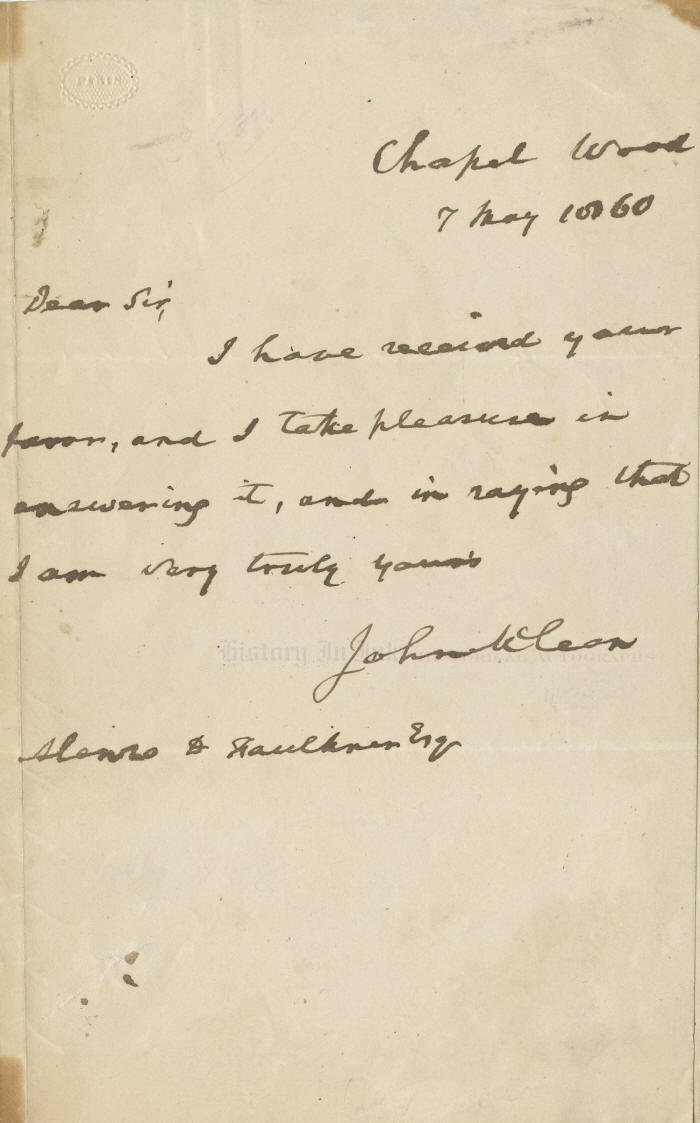1906411
John McLean
Scroll down to see an image of the item below the description
On the cusp of the Civil War, the anti-slavery Justice McLean replies to a Massachusetts lawyer
John McLean, 1785–1861. Associate Justice, United States Supreme Court, 1829–1861. Autograph letter signed, John McLean, one page, 5” x 8¼”, with integral leaf attached, on blind-embossed stationery, Chapel Wood [near Cincinnati, Ohio], May 7, 1860.
McLean, a devout Methodist, is perhaps best known for his dissent from the United States Supreme Court’s infamous decision in Dred Scott v. Sandford, 60 U.S. 393 (1857). The majority, led by Chief Justice Roger B. Taney, ruled that Scott, a slave, was not an American citizen and therefore could not seek his freedom in federal court. For McLean, the slave owner’s argument that “a colored citizen would not be an agreeable member of society” was “more a matter of taste than of law.”
In this letter, McLean, as Associate Justice, sends a courteous reply to “Alonzo D. Faulkner, Esq.” He writes, in full: “I have received your favor, and I take pleasure in answering it, and in saying that I am very truly yours . . . ” Alonzo Davenport Faulkner (1839–1894) was evidently a Massachusetts lawyer.
When President Andrew Jackson appointed McLean to the Supreme Court in 1829, McLean was already on on record as opposing slavery from his time as a judge of the Ohio Supreme Court. In State v. Carneal (1817) (officially unpublished), he wrote the court’s opinion holding that a Kentucky slave owner forfeited his ownership when the sold the slave to a third party who had him work in Cincinnati. In dictum, McLean wrote that, although the “abstract principle of slavery” was not an issue in the case, the court, “as well as from the principles recognized by our Constitution and Laws, could not hesitate in declaring that slavery . . . , except for the punishment of crimes, is an infringement upon the sacred rights of man: Rights, which he derives from his Creator, and which are inalienable.”
McLean served in Congress before returning to Ohio. President James Madison appointed him commissioner of the General Land Office in 1822 and made him Postmaster General in 1823, a position to which President John Quincy Adams reappointed him in 1825. Four years later, President Andrew Jackson appointed him an Associate Justice of the Supreme Court. McLean took the oath of office on January 11, 1830, and served 31 years until he died on April 4, 1861. During his time on the United States Supreme Court, McLean wrote 160 majority opinions and 30 dissents, including his Dred Scott dissent. At various times, he was assigned as the Circuit Justice for the districts that included Tennessee, Kentucky, Ohio, Michigan, Illinois, and Indiana. Less than a month after he wrote this letter, he published a decision in an appeal in a federal admiralty case from the Southern District of Ohio, The Eolian, 8 F. Cas. 740 (C.C.S.D. Ohio 1860) (No. 4,504).
McLean had been in Ohio for some time when he wrote this letter. Our research has found several letters that he wrote around that time from Chapel Wood, his home near Cincinnati.
McLean has written and signed this letter in black steel-nib pen. The letter has a blind-embossed oval symbol that reads “paris” at the upper left. There are two flattened horizontal mailing folds not touching the signature. There is an extra vertical fold along the integral leaf fold, and the front is not quite folded squarely with the integral leaf. The letter is lightly soiled, with small toning spots in the blank margins at at all corners except the lower right, and in the blank upper margin there are a paper clip impression with a faint old dealer pencil marking. Overall the letter is in fine condition.
Unframed.







